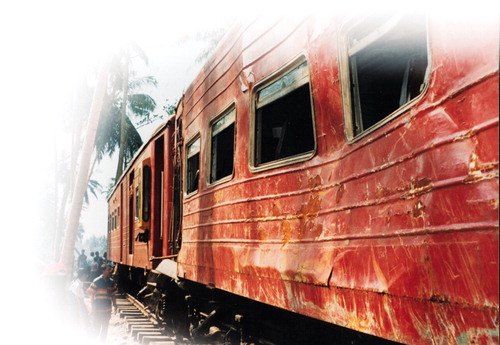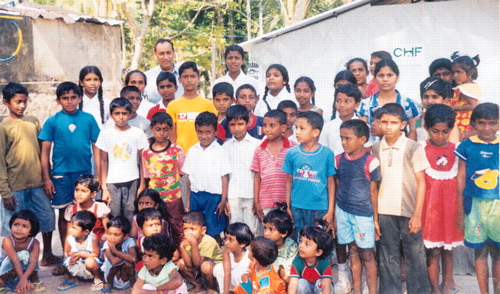Bitter Enemies Find Common Ground In Disaster's Aftermath

Despite sharp divisions drawn during a 20-year ethnic conflict, Sri Lankans united to help one another survive in the face of the nation's most deadly natural disaster—the Indian Ocean tsunami.
This was an observation of David Ratnavale, M.D., a psychiatrist in Bethesda, Md., and consultant in disaster management originally from Sri Lanka. He traveled more than 1,000 miles of Sri Lanka's coastline to participate in disaster relief efforts and assist Sri Lankan President Chandrika Kumaratunga assess the response and relief effort in affected areas.
Ratnavale arrived two weeks after the tsunami struck on December 26, 2004, and stayed for three months.
During this time APA designated him as a “point person” in Sri Lanka and asked him to offer his expertise to other APA members working in the country to provide disaster relief if needed. However, he funded his own travels, he noted.
At press time, he had returned to Sri Lanka to organize a disaster-management seminar and continue his work as a disaster consultant.
In the aftermath of the disaster, Ratnavale told Psychiatric News, places of worship—mosques, churches, and temples— served as temporary shelters for survivors. The communities came together in a“ coalition of compassion,” he said. “All religious and ethnic distinctions disappeared.”
That cooperation is remarkable for a country that since 1983 has been divided by an ethnic war between the Singhalese majority, most of whom are Buddhist, and a separatist group known as the Liberation Tigers of Tamil Eelam, a minority who speaks Tamil and is mostly Hindu.
The Tamil separatists, who are seeking independence from the government, reside in the northern and eastern parts of the island, and the Singhalese majority live in the central and southern parts.
In 22 years nearly 60,000 people have died as a result of this conflict. The tsunami, by comparison, took almost 40,000 lives in Sri Lanka.
Though a four-year cease-fire pact is still in effect, “the situation is far from peaceful,” Ratnavale noted.
In 1998 he served as chair of a task force established by Kumaratunga to assist those traumatized by the ethnic conflict. During his travels earlier this year, he noted that those living in war-torn areas seemed “better prepared” to deal with the damage wrought by the tsunami.
“They responded more quickly and began immediately to rebuild,” he said.
Although people living in war-torn regions “were not less emotionally affected,” he added, “they may have been better able to cope with the emotional impact” of the tsunami because they had been living under difficult and sometimes traumatic circumstances for years.

During his travels, Ratnavale evaluated the mental health needs of survivors and saw many people with symptoms of major depression, acute anxiety, suicidality, and psychosomatic complaints “in the context of acute grief and loss.”
Far rarer were those with symptoms of posttraumatic stress disorder (PTSD), though this was only his impression, he emphasized, since it was not based on strict diagnostic criteria.
He speculated that some tsunami survivors may exhibit signs of“ PTSD-like” syndromes, which are somehow managed by“ society's natural healing capacities.”
For instance, more than 1,000 Sri Lankan children lost both parents in the tsunami. “For children who witnessed both parents being swept away by the water” and are traumatized, he said, “the relatives who assume care of the children often help the children to deal with their grief and distress.” He pointed out that such social networks in developing countries have been found to be protective for people with mental illness.
It is important that psychiatrists find a way to tap into social support networks for the benefit of disaster survivors, Ratnavale emphasized.
Ratnavale said he has heard from many APA members who are interested in providing services to tsunami survivors. “Psychiatrists can play a collaborative role by serving as a link to other medical professionals” in hospitals and clinics, he noted.
However, he said that it can be “difficult for psychiatrists to find a place to provide disaster relief” in a country stricken by disaster such as Sri Lanka, because coordination of disaster relief services can be problematic.
In the immediate aftermath of a disaster, he pointed out, there may be limited use for psychiatric interventions. “You are just carrying people away and making sure they are not dying.”
He noted that disasters have been occurring since ancient times, and“ people have always seemed to manage.” The role of psychiatrists, he said, is to ensure that survivors “are not managing under such distress that their mental health is forever compromised.”
It is the strength of the human spirit that stuck with Ratnavale as he toured his native country.
“I came away from the experience feeling that people have incredible resilience,” he remarked. As psychiatrists, “we have to tap into that.” ▪



